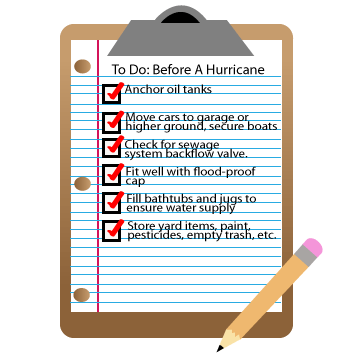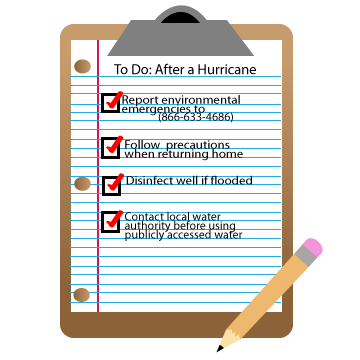Maryland is at risk for the damage caused by high winds and flooding from hurricanes or, more typically, the tropical storms that follow them. These storms can harm the environment and create health risks such as oil and chemical spills and contaminated drinking water. Some of this damage can be prevented by following the Maryland Department of the Environment’s (MDE) preparedness tips.

Before a Hurricane: Prevent and minimize damage
Stay connected and updated
Listen to NOAA Weather Radio and local radio and television news to monitor for severe weather updates and warnings. Sign up to receive text and email alerts from your county’s social media tools. View the Maryland Emergency Management Agency’s live Osprey Emergency Management Map to track weather watches and warnings. Follow MDE’s twitter feed @MDEnvironment.
Avoid oil spills, reduce dangers
Spills from overturned boats, cars and oil tanks can release petroleum products and contaminate not only the flood water but also groundwater reserves and drinking water. When the flood water recedes, toxic residue may be left behind, contaminating the water for years. To avoid oil spills:
Tie down oil tanks to avoid spillage. One of the most inexpensive security methods is to install four ground anchors connected across the top of the tank with metal straps. For more information see:
-
If flooding is imminent and you are unable to tie down your oil tank, temporarily plug the fill and vent pipes of the tank to prevent loss of oil in case of flood or high winds. Make sure to take out the plug as soon as the storm is over.
-
Move cars into a garage if possible, or move to higher ground to lower their risk of overturning and spilling gasoline, anti-freeze, battery acid, etc. into flood waters.
-
Remove boats from a marina and move to a safe location if possible; if not, make sure they are securely anchored to the dock.
Secure and turn off propane tanks, which can be easily moved by flood waters and damage other houses or can explode if ruptured and ignited.
Take actions on sewage systems and water supplies
Sewage systems can flood and release untreated sewage into local waterways. Before a hurricane, make sure your sewage system has either an interior or exterior backflow valve to prevent a flooded system from contaminating not only the house but the flood waters as well.
Owners of wells in flood-prone areas should fit their wells with a flood-proof well cap. If you suspect that flood waters have entered your well, you should not turn on the pump because there is a danger of electrical shock and the potential for damage to the well and pump. You should not drink or wash with the well water until it is disinfected. See the MDE well protection fact sheet for more information on how to protect your well before a hurricane, well disinfection resources and more.
Ensure a supply of water for sanitary purposes such as cleaning and flushing toilets. Fill clean bathtubs, jugs, bottles and cooking utensils with drinking water. Boil water from the bathtub before use.
Secure items to prevent contamination of waterways and reduce dangers
Secure anything that may contaminate local waterways. Steps to take include:
- Remove or elevate all containers of paint, pesticides, household chemicals, etc. stored in basement or garage to prevent spills.
- Empty recycling bins and garbage cans to avoid trash spilling and move empty bins indoors if possible.
- Brace or elevate furnace to avoid spillage.
- Relocate lawn tractors, lawnmowers, leaf blowers, tools, etc. to a higher elevation to avoid gas spills.
- Make sure outdoor air conditioners, heat pumps or package units are firmly held in place by cement blocks or tied down to prevent spills.
- Make sure all yard items are relocated into the house to prevent them from being swept away into the flood waters.

After a Hurricane: A safe and healthy cleanup
A critical part of MDE’s mission is to foster safe communities. In the event of a hurricane, key staff and assets are prepared to respond as necessary. Contact the MDE's Emergency Response Team to report any oil or chemical spills on land and in water at 866-633-4686 (866-MDE-GOTO).
Flood waters and standing waters pose various risks, including infectious diseases, chemical hazards and injuries. Follow these steps when returning to your home after a hurricane to protect yourself and your family. Also see general “after a flood” precautions, cleanup tips, and more.
If you use a household well and it has flooded, do not turn on the pump due to danger of electric shock. Assume that your well is contaminated with bacteria and needs to be disinfected. Do not drink or wash with water from the flooded well. Contact the local health department or a certified laboratory to have your well sampled for contamination. See more information on how to care for your well after a flood.
After the event, contact your local water authority to determine the potability (drinking water safety) of all publicly accessed water. If you are not sure of the safety of the water and cannot contact or reach the local authority, boil any water that will be used for food preparation, especially for foods that require no further cooking prior to consumption.
Understand what to do after a hazardous materials incident and follow decontamination instruction from your local authorities.
Contact Info
Please direct questions or comments concerning this page to MDE's Office of Communications at 410-537-3003.
Additional Information and Related Links